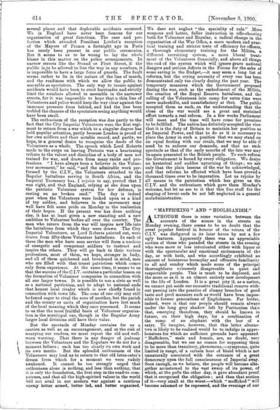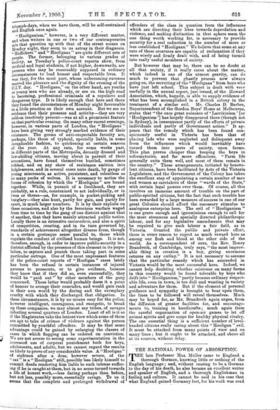" MAFFICKING " AND "HOOLIGANISM."
1LTHOUGH there is some variation between the accounts of the scenes in the streets on Monday evening, there seems to be no doubt that the great popular festival in honour of the return of the C.I.V. was disfigured in its later hours by not a few ugly features. Apparently there was an appreciable section of those who paraded the streets in the evening who were more or less intoxicated either with liquor or with the spectacular and emotional excitements of the day, or with both, and who accordingly exhibited an amount of boisterous horseplay and offensive familiarity to all and sundry which made some of the principal thoroughfares extremely disagreeable to quiet and respectable people. This is much to be deplored, and the more so as it is an almost entirely new development in the life of London. It is a great pity if, as a nation, we cannot put aside our excessive traditional reserve with- out passing into the practice of clumsy breaches of good taste and good manners such as would have been impos- sible to former generations of Englishmen. Far better, indeed, were it that our people should remain always under the long grey shadow left by Puritanism than that, emerging therefrom, they should be known in future, on their high days, for a combination of the romp of an elephant with the leer of a satyr. To imagine, however, that this latter alterna- tive is likely to be realised would be to indulge in appre- hensions for which no sufficient grounds have appeared. " Maffickers," male and female, are, no doubt, very disagreeable, but we see no reason for supposing them to be more than transitory, phenomena,—symptoms, quite limited in range, of a certain heat of blood which is not unnaturally associated with the entrance of a great democracy upon the full consciousness of Imperial sway. Soon enough, as we believe, the people will become alto- gether accustomed to the vast sweep of its power, of which, at the polls the other day, it gave abundant proof that it recognised the obligation ; and then that section of it—very small at the worst—which " mafficked " will become ashamed or be repressed, and the evenings of our triumph-daya, when we have them, will be self-restrained and English once again.
"Hooliganism," however, is a very different matter, and when writers in one or two of our contemporaries mix that question up with that of the street scenes on Monday night, they seem to us astray in their diagnosis. Maffickers " and " Hooligans " are quite different sets of people. The former, belonging to various grades of society, as Tuesday's police-court reports show, from medical and legal students, if not higher, downwards, are persons who may be reasonably supposed in ordinary circumstances to lead honest and respectable lives. It was ,they, for the most part, whose unbecoming excesses marred the pleasure and the dignity of the evening of the C.I.V. day. "Hooligans," on the other hand, are youths or young men who are already, or are on the high road to becoming, professional criminals of a repulsive and dangerous type. It is likely enough that here and there they found the circumstances of Monday night favourable to a little practice on their own account. But we see no evidence that their presence and activity—they are very seldom inactively present—was at all a prominent feature on that particular evening. On many other recent evenings, however, in various parts of London, the " Hooligans " have been giving very strongly marked evidence of their existence. The germs of anti-respectable ferocity are, perhaps, like those of typhoid, specially liable, in some inexplicable fashion, to quickening at certain seasons of the year. At any rate, for some weeks past, in different parts of the Metropolis, decently dressed and law-abiding citizens, moving about in pursuit of their avocations, have found themselves bustled, sometimes robbed, and on any show of resistance smitten into helplessness, and, in several cases unto death, by gangs of young miscreants, as active, persistent, and relentless as so many packs of wolves. It is necessary to notice the forces of cohesion by which the "Hooligans" are bound together. While, in pursuit of a livelihood, they are probably, as a rule, constrained to act individually, or in twos or threes—as, for example, in pocket-picking and burglary—they also hunt, partly for gain, and partly for sport, in much larger numbers. It is by their exploits on these occasions, and also by the ferocious warfare waged from time to time by the gang of one district against that of another, that they have mainly attracted public notice. Locally there is an extensive camaraderie, and also a spirit of competition, creating, and in its turn governed by, standards of achievement altogether diverse from, though in a certain grotesque sense parallel to, those which regulate the conduct of civilised human beings. It is not, therefore, enough, in order to improve public security in a district afflicted by the presence of this element in its popu- lation, to capture and punish those taking part in some particular outrage. One of the most unpleasant features of the police-court reports of " Hooligan " cases lately has been the refusal in certain instances of injured persons to prosecute, or to give evidence, because they knew that if they did so, even successfully, they would be "paid out" by other members of the gang concerned. These latter would probably deem it a point of honour to avenge their comrades, and would gain rank in their own world by the daring and the exemplary cruelty with which they discharged that obligation. In these circumstances, it is by no means easy for the police, however intelligent, courageous, and energetic, to break up these companies, we may almost say tribes, of savages infesting several quarters of London. Least of all is it so if the Magistrates take the lenient view which some of them are apt to take of crimes of violence against the person committed by youthful offenders. It may be that some advantage could be gained by enlarging the classes of cases in which flogging can be ordered on conviction. We are not averse to seeing some experimentation in the increased use of corporal punishment both for boys, adolescents, and adults, but we cannot regard the results as likely to prove of any considerable value. A "Hooligan" of eighteen after a dose, however severe, of the "cat" is a" Hooligan" still, possibly less likely himself to commit deeds rendering him liable to such intense suffer- ing if he is caught at them, but in no sense turned towards a life of honest work,—less daring perhaps than before, but not less, possibly more, essentially savage. To us it seems that the complete and prolonged withdrawal of offenders of the class in question from the influences which are directing their lives towards depredation and violence, and making distinction in that sphere seem the one thing worth working for, is necessary to provide security for a real reduction in the number of more or less established "Hooligans." We believe that some at any rate of these creatures are capable of reclamation if they were wisely and firmly dealt with, and of being turned into really useful members of society.
But however that may be, there can be no doubt at all that society, if it really cares about the matter, which indeed is one of the utmost gravity, can do much to prevent that ghastly process now always going on, the recruiting of the "Hooligans" from boys who have just left school. This subject is dealt with very usefully in the annual report, just issued, of the Howard Association, which, happily, is able to supply evidence of what has been accomplished in a British colony in the treatment of a similar evil. Mr. Charles D. Barber, Superintendent of the Gordon Boys' Home at Melbourne, states that "the once great nuisance of Larrikinism ' [or 'Hooliganism'] has largely disappeared there (though not in Sydney), in consequence partly of the efforts of private individuals and partly of Government action." It ap- pears that the remedy which has been found con- spicuously useful in Victoria has been that of placing lads who were neglected and delinquent away from the influences which would inevitably have turned them into pests of society, upon farms. This plan proves cheaper than keeping the boys in reformatories, and far more efficacious. "Farm life generally suits them well, and most of them remain in the country." These arrangements, initiated by benevo- lent citizens, have been facilitated by Acts of the Victoria Legislature, and the Government of the Colony has taken the excellent step of appointing a certain number of men and women as caretakers of these "wards of the State," with certain legal powers over them. Of course, all this involves an immense amount of trouble on the part of public-spirited citizens, but the fact that such trouble has been rewarded by a large measure of success in one of our great Colonies should afford the. necessary stimulus to analogous enterprise here. The evil of " Hooliganism " is one grave enough and ignominious enough to call for the most strenuous and specially directed philanthropic labour, and for any legislative amendments that may be required to give such labour a fair field, as in Victoria. Granted the public and private effort, there is every reason to expect as much reward here as among our flesh and blood at the other side of the world. As a correspondent of ours, the Rev. Henry Brandreth, of Cambridge, truly says, "the most improv- able thing in creation is a boy, giving enormous returns on any outlay." It is not necessary to assume that the particular remedy which has succeeded in Victoria would be the most successful here. Indeed, we cannot help doubting whether existence on many farms in this country would be found tolerable by boys who drift into " Hooliganism," partly because ordinary respect- able life, even in town, is too dull und wanting in variety and adventure for them. But if the element of personal guidance and sympathy is brought to bear upon them, the lines to be followed will reveal themselves. Much may be hoped for, as Mr. Brandreth again urges, from the diffusion of greater facilities for, and encourage- ments to, training in handicrafts ; much again from the careful organisation of open-air games to let off animal spirits and give scope for healthy physical rivalry. The one essential thing is a sufficient number of level- headed citizens really caring about this "Hooligan " evil. It must be attacked from many points of view and on many lines ; but it ought to be attacked, and above all at its sources, without delay.























































 Previous page
Previous page